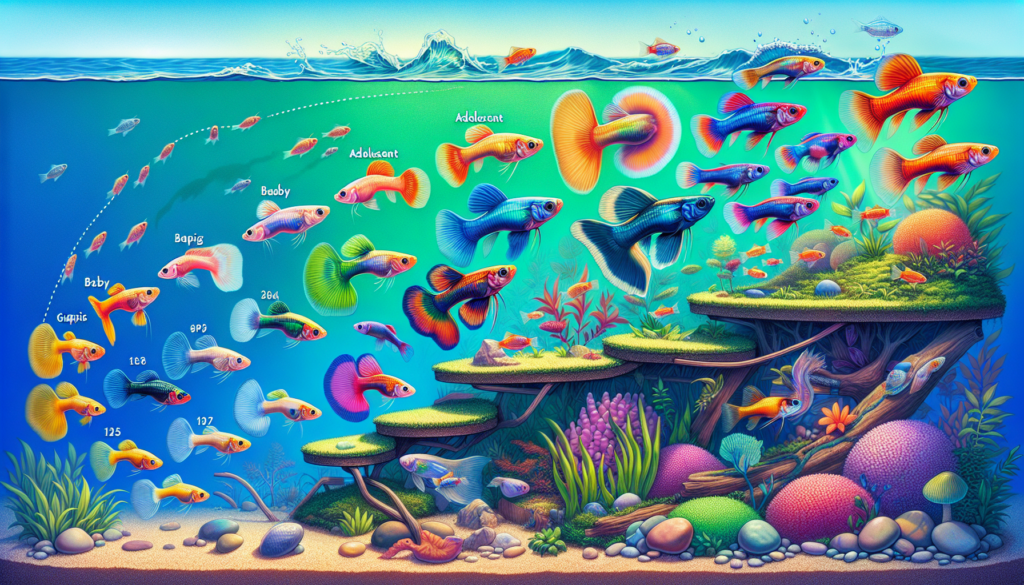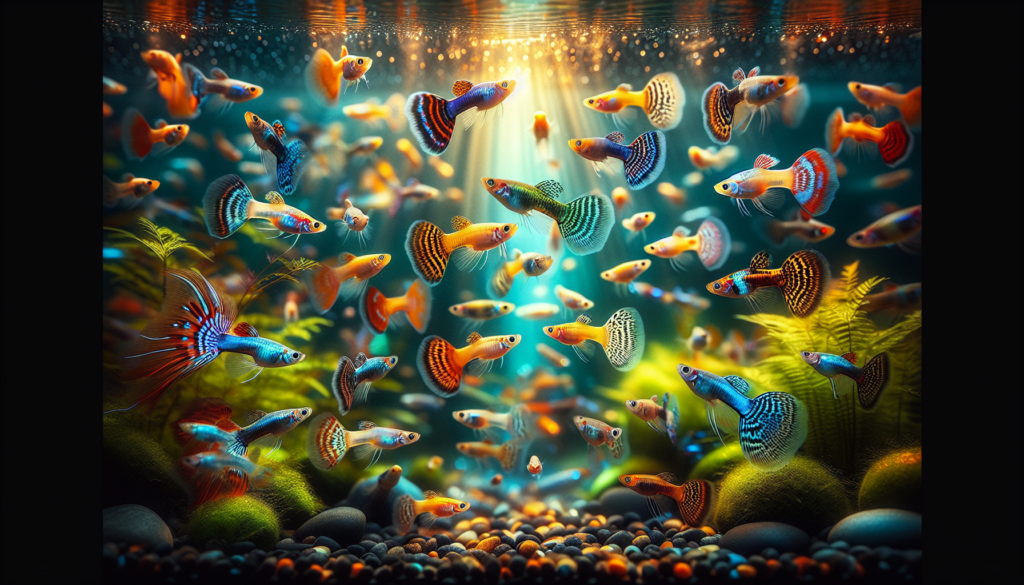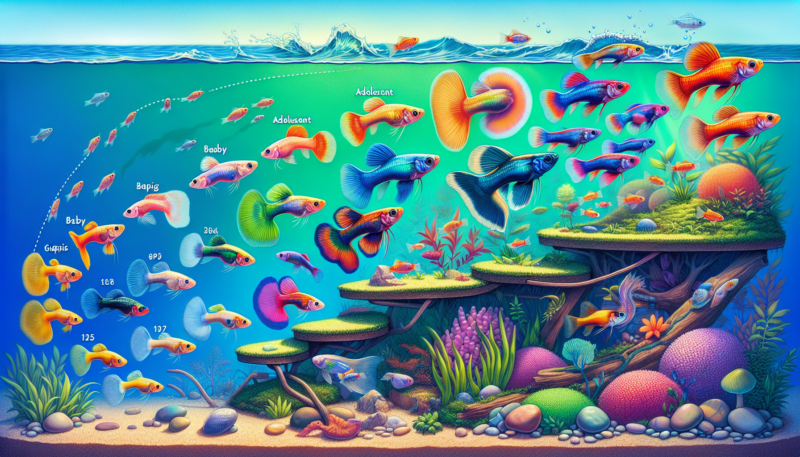Have you ever wondered how long those colorful and lively guppies live for? In this article, we will explore the fascinating lifespan of these popular freshwater fish. From the moment they are born, guppies embark on a journey full of growth, challenges, and surprises. Whether you’re a guppy enthusiast or simply curious, join us as we uncover the secrets behind the remarkable longevity of these tiny aquatic creatures.
Factors That Affect the Lifespan of Guppies
Guppies, known for their vibrant colors and lively nature, have become a popular choice among fish enthusiasts. However, the lifespan of these tropical freshwater fish can vary greatly depending on several crucial factors. Understanding these factors will not only help you provide the best care for your guppies but also ensure they live a long and healthy life.
Genetics
Just like any other living organism, genetics plays a significant role in determining the lifespan of guppies. Different guppy strains have distinct genetic makeup, resulting in variations in their lifespan. Some strains are known to live longer than others, so it’s essential to consider the specific strain when selecting your guppies.
In addition, inbreeding can lead to genetic disorders that may compromise the overall health and lifespan of guppies. It is crucial to avoid breeding guppies that are closely related to prevent the potential negative effects of inbreeding.
Water Quality
Maintaining optimal water quality is of utmost importance in ensuring the longevity of guppies. Poor water conditions can have detrimental effects on their health and ultimately shorten their lifespan.
It is vital to regularly monitor water parameters such as pH levels, ammonia, nitrate, and nitrite levels to ensure they fall within the acceptable range for guppies. Sudden fluctuations in temperature and pH levels can cause stress and negatively impact their health, leading to a shorter lifespan.

Diet and Nutrition
Proper nutrition is essential for the overall health and longevity of guppies. These omnivorous fish require a balanced diet that includes both plant-based and protein-rich food.
Feeding habits can significantly impact the lifespan of guppies. Overfeeding or relying solely on low-quality food may lead to obesity and various health issues. On the other hand, a well-rounded diet consisting of high-quality flakes, pellets, live or frozen foods, and occasional vegetable matter will promote optimal health and extend their lifespan.
Tank Size and Environment
The size of the tank and the overall environment are crucial factors in the lifespan of guppies. Properly sized tanks provide guppies with sufficient swimming space, reducing stress and promoting their overall well-being.
Guppies are small, active fish that require ample room to swim and explore. It is recommended to provide at least 5 gallons of water per guppy to ensure their comfort and longevity. Additionally, a well-decorated tank with hiding places and suitable aquarium decorations mimicking their natural habitat will contribute to their overall well-being.
Keeping the water clean and properly maintained is also vital. Regular water changes, filtration, and maintaining optimal water parameters will create a healthy environment for guppies, preventing potential diseases and extending their lifespan.

Social Interaction
In the wild, guppies are social creatures that thrive in the presence of their counterparts. The same holds true for guppies in captivity.
The presence of tank mates and suitable social interaction positively impacts their overall well-being and lifespan. However, it is crucial to ensure that tank mates are compatible, as aggression and stress caused by incompatible tank mates can lead to a shorter lifespan.
Guppy Lifespan: Average Duration
Guppies typically have a shorter lifespan in the wild compared to those kept in captivity. In their natural habitat, guppies have to face predation, disease, and other environmental challenges that can significantly reduce their lifespan. On average, wild guppies have a lifespan of around 2 years.
In captivity, guppies receive proper care and protection from external threats, allowing them to live longer. Under ideal conditions, guppies in well-maintained tanks can live up to 3-5 years, providing ample time to enjoy their beauty and companionship.
Life Stages of Guppies
Guppies go through several distinct life stages, each with its own unique characteristics and requirements. Understanding these stages will help you provide appropriate care for your guppies at each phase of their life.
Fry Stage
The fry stage is the initial phase of a guppy’s life, beginning shortly after birth. At this stage, guppies are highly vulnerable and require special attention. They should be provided with suitable hiding places and fed with finely crushed, protein-rich foods such as baby brine shrimp or powdered fry food.
Juvenile Stage
As guppies grow, they enter the juvenile stage. At this point, they become more independent and resilient. Feeding them regular guppy food in small portions throughout the day will support their growth and overall development.
Adult Stage
Guppies reach their adult stage when they have fully developed and display their vibrant colors and unique patterns. They are now sexually mature and can reproduce. A balanced diet, proper tank conditions, and social interaction with suitable tank mates ensure their well-being during this phase.
Senescence and Aging Process
Similar to any other living creature, guppies undergo the aging process as they reach their twilight years. During this stage, their activity levels may decrease, and their colors may fade. It is crucial to provide extra care and attention during this phase, including regular health check-ups and adjusting their diet to meet their changing needs.
Recognizing Healthy Guppies
To ensure the well-being of your guppies, it is essential to be able to recognize signs of good health and monitor their behavior regularly.
Physical Characteristics of Healthy Guppies
Healthy guppies have vibrant colors, strong and flowing fins, and clear eyes. They should be active, swimming freely throughout the tank. Surface breathing is normal for guppies due to their unique anatomy.
Behavioral Indicators
Observing their behavior is key to gauging guppy health. Healthy guppies are alert, curious, and responsive to their surroundings. They actively explore their environment and interact positively with tank mates.
Common Signs of Illness or Poor Health
Signs of illness or poor health in guppies include loss of appetite, lethargy, clamped fins, discoloration, fin rot, fungal infections, or the presence of parasites. Any noticeable changes in behavior or physical appearance should prompt immediate action to diagnose and treat potential health issues.
Promoting Longevity in Guppies
By providing optimal care, you can significantly enhance the lifespan of your guppies. Here are some essential tips to promote longevity:
Maintaining Optimal Water Conditions
Regularly monitor and maintain water parameters within the acceptable range for guppies to ensure a healthy environment. Perform routine water changes and use high-quality filtration systems to keep the water clean and free from toxins.
Providing a Balanced Diet
Offer a well-rounded diet that meets the nutritional requirements of guppies. Include high-quality flakes, pellets, and occasional live or frozen foods to ensure they receive all the necessary nutrients for their well-being.
Avoiding Overstocking and Overbreeding
Overcrowding the tank not only leads to increased stress levels in guppies but also compromises overall water quality. Avoid overbreeding guppies to prevent overcrowding and strive for a balanced ratio of males and females in your tank.
Regular Health Check-ups
Schedule regular check-ups with a qualified veterinarian specializing in aquatic pets. Professional guidance and early detection of potential health issues can significantly prolong the lifespan of your guppies.
Appropriate Handling and Care
Handle your guppies with care, minimizing stress during routine tank maintenance or when moving them to a different environment. Gentle and cautious handling reduces the risk of physical injuries and stress-related ailments.
In conclusion, understanding the various factors that affect the lifespan of guppies will enable you to provide optimal care and ensure their longevity. By considering genetics, water quality, diet, tank size and environment, social interaction, and recognizing signs of health and illness, you can make informed decisions that promote the well-being and longevity of these beautiful aquatic companions.
